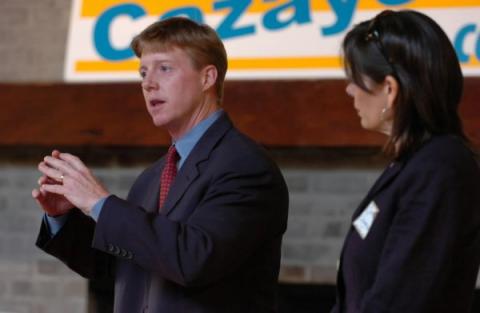The New Anti-Choice Democrats: Can We Work With Them?
Reassuring Southern voters about core social issues like abortion was likely the only way Democrats could have won recent special elections in Mississippi and Louisiana. So how can reproductive health advocates get newly-elected anti-choice Dems to work with us?
In a campaign TV advertisement, Don Cazayoux, the Louisiana Democrat
who won a hotly contested Congressional seat in a May 3 special election,
introduced voters to his parents, Don Sr. and Ann. "We thought you
should know what he learned growing up," Ann Cazayoux said. As photographs
of Don Jr. with babies flashed across the screen, she continued, "We
taught him every life is precious." The words "Pro-life" appeared
in the bottom left hand corner.
Indeed, trumpeting broad opposition
to abortion rights was a key strategy of Cazayoux’s campaign. His
improbable three-point win occurred in a district where 59 percent of
the electorate had voted for George W. Bush over John Kerry in 2004.
Meanwhile, in north Mississippi, Democrat Travis Childers was making
a similar case. "Keep this in mind," Childers said matter of factly
in one ad. "I’m pro-life and pro-gun."
On May 14, Childers, too, was elected to Congress, in a district where
62 percent of voters had supported Bush’s reelection.  Cazayoux, Photo by Arthur D. Lauck, The Advocate
Cazayoux, Photo by Arthur D. Lauck, The Advocate
Though both candidates ran
primarily on a platform of creating jobs and providing universal health
care, the media was fascinated by their anti-choice stances, calling
them "conservative," "Blue Dog" Democrats, despite their strong
pro-labor, antiwar positions. In part that’s not surprising; the mainstream
media has long identified politicians more by their statements on divisive
social issues than by their records on more complex economic ones.
But it would be naïve to downplay
Cazayoux and Childers’ anti-choice ideologies. As a state legislator,
Cazayoux voted for one of the harshest anti-abortion laws in the country,
outlawing abortion in every case except when the mother’s life is
at stake — including in cases of rape, incest, or if the woman’s
physical or emotional health is at risk. Cazayoux says he’d support similar legislation
at the federal level.
Childers, whose previous job was as Prentiss County chancery clerk — a mostly administrative
position — doesn’t have a record on abortion. But when the National
Republican Campaign Committee attacked Childers by linking him to Barack
Obama’s opposition to so-called "partial birth abortion" bans
and support for comprehensive sex-ed, Childers hit back hard, claiming
he "didn’t know" and "had never even met" Obama.
In a reproductive health dream
world, pro-choice Democrats would have been elected in Lousiana’s
eighth district and Mississippi’s first. Given widespread anger with
the Bush administration and its conservative policies, maybe Childers
and Cazayoux could have moderated their abortion positions and still
cruised to victory. But in reality, reassuring conservative Southern
voters about core social issues was likely the only way Nancy Pelosi
could have added these two seats to her total. And by preserving a continued
Democratic majority in the House, Cazayoux and Childers, whatever their
personal opinions on abortion, ensure that bills restraining choice
will largely stay off the legislative docket. The last major Congressional
vote seeking to restrict American women’s reproductive rights occurred
in 2006, when Republicans were still in control.
Of course, pro-choicers want
to do much more than just keep existing reproductive rights from being
rolled back; we want to expand upon those rights and make them more
uniform throughout the country. We want women in cities, suburbs and
rural places to enjoy the full range of reproductive health education, information,
care, and yes, access to abortion, regardless of their ability to pay,
their age, or any other facet of their identity. Can anti-choice Democrats
be allies in those goals?
For some of those goals, the
answer is yes. Since 2005, anti- and mixed-choice Democrats have been
pushing the 95-10 initiative, which seeks to reduce the abortion rate
(which is, in fact, already going down) by 95 percent over the next
decade. While the plan would expand federal support for family planning
and access to contraceptives, it also includes parental notification
laws and a ban on certain later-term abortion procedures. Those aren’t
policies many Democrats who identify as pro-choice will get behind.
But Congressional advocates
for reproductive health, as well as pro-choice interest groups, should
be aggressively reaching out to anti-choice Democrats on issues such
as comprehensive sex education and access to birth control. When it
comes to pharmacists’ responsibility to provide women with The Pill,
for example, even those who support restricting abortion rights can
agree that women have the right not to face discrimination when filling
a prescription.
This year, House Democrats
continued funding President Bush’s abstinence-only program. That should
change during the next Congress, but it won’t be possible without
the support of a core group of socially conservative Democrats and socially
moderate Republicans. These centrists should agree to put aside their
ideology on abortion to ensure that our children’s’ education is
medically and scientifically sound.
On later-term abortions, parental
notification, and federal funding for abortion, pro-choicers may need
to part ways with the Cazayouxs and Childerses of the world. We should
do so respectfully and without alienating them or their supporters.
Just by being Democrats from the South, these politicians are giving
reproductive rights a major lift. By rebuilding progressivism in that
region, they ensure that more Democrats — some of them pro-choice —
will receive a fair hearing when they run for office. Stay tuned, for
example, to Josh Segall, a 29-year old pro-choice Dem running
for Congress in a traditionally Republican Alabama district. Candidates
like Segall have the potential to de-stigmatize pro-choice
politics in the South. But for that to happen, "Democrat" can’t
be a scary word. Guys like Cazayoux and Childers help make that transition
happen.
